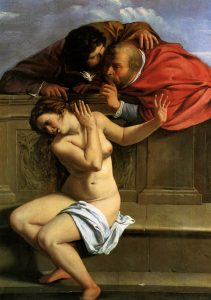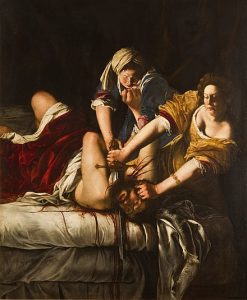 Artemisia’s mother died when she was twelve years old, in 1605. Artemisia could have joined a convent as a nun. Instead, she chose to grind pigment for her father’s art in “Blood Water Paint” (Dutton 2018) by Joy McCullough. Artemisia is now seventeen and paints most of her father’s paintings for which he takes credit ,in this passionate verse-story based on the life of the artist, Artemisia Gentileschi.
Artemisia’s mother died when she was twelve years old, in 1605. Artemisia could have joined a convent as a nun. Instead, she chose to grind pigment for her father’s art in “Blood Water Paint” (Dutton 2018) by Joy McCullough. Artemisia is now seventeen and paints most of her father’s paintings for which he takes credit ,in this passionate verse-story based on the life of the artist, Artemisia Gentileschi.
A handsome and famous artist, Agostino Tassi, visits her home and soon becomes her tutor. Artemisia falls in love with him and thinks he might be a way out of her father’s house—and into a world where she’ll be able to paint under her own name in a marriage with another talented artist. Unfortunately, Tassi cannot wait—and cannot take no for an answer. He rapes her. In this world where men take what they want, Artemisia must decide if she will be silent or tell the truth to the world. She says:
Why, though, does it take/a mother, daughter, sister/
for men to take/a woman at her word?
I wish men/would decide/if women are heavenly/angels on high,/
or earthbound sculptures/for their gardens/
But either way we’re beauty/for consumption.
 This certainly puts one in mind of the contemporary #Metoo movement.
This certainly puts one in mind of the contemporary #Metoo movement.
Artemisia is buoyed by the memory of the biblical stories her mother had told her years before. Susanna (in the Book of Daniel) was a strong woman who was accosted by two elders while bathing in her secluded garden. The elders threaten her—if she does not have sex with them, they will accuse her of meeting a young lover. Susanna will not be blackmailed. She speaks her truth and is nearly executed for it. But Daniel steps in and questions both the elders. A discrepancy is discovered in their stories. Susanna is absolved of guilt.
Artemisia cannot stay silent. With the help of her somewhat reluctant father, Artemisia accuses Tassi of rape. In court, Artemisia is accused of fornication and subjected to torture to verify her claims. For her sanity, Artemisia conjures the biblical story until the lines between herself and Susanna are blurred. She will not give up.
Artemesia thinks back to another story told by her mother—about the heroine Judith, who, with her maid, beheads the oppressing Assyrian general Holofernes to save the Jewish people.
Eventually, Artemisia will paint each of these biblical heroines, from the point of view of a woman, rather than that of a man. They will make her famous. As told in McCullough’s story, Artemisia is understandably angry, bitter, and tenacious. Young readers need to know it’s okay—it’s even good—to feel anger—and to demand justice.
Patricia Hruby Powell is the author of the award-winning Josephine; Loving vs Virginia; and Struttin’ With Some Barbecue among others. She teaches community classes at Parkland. talesforallages.com
Leave a Reply